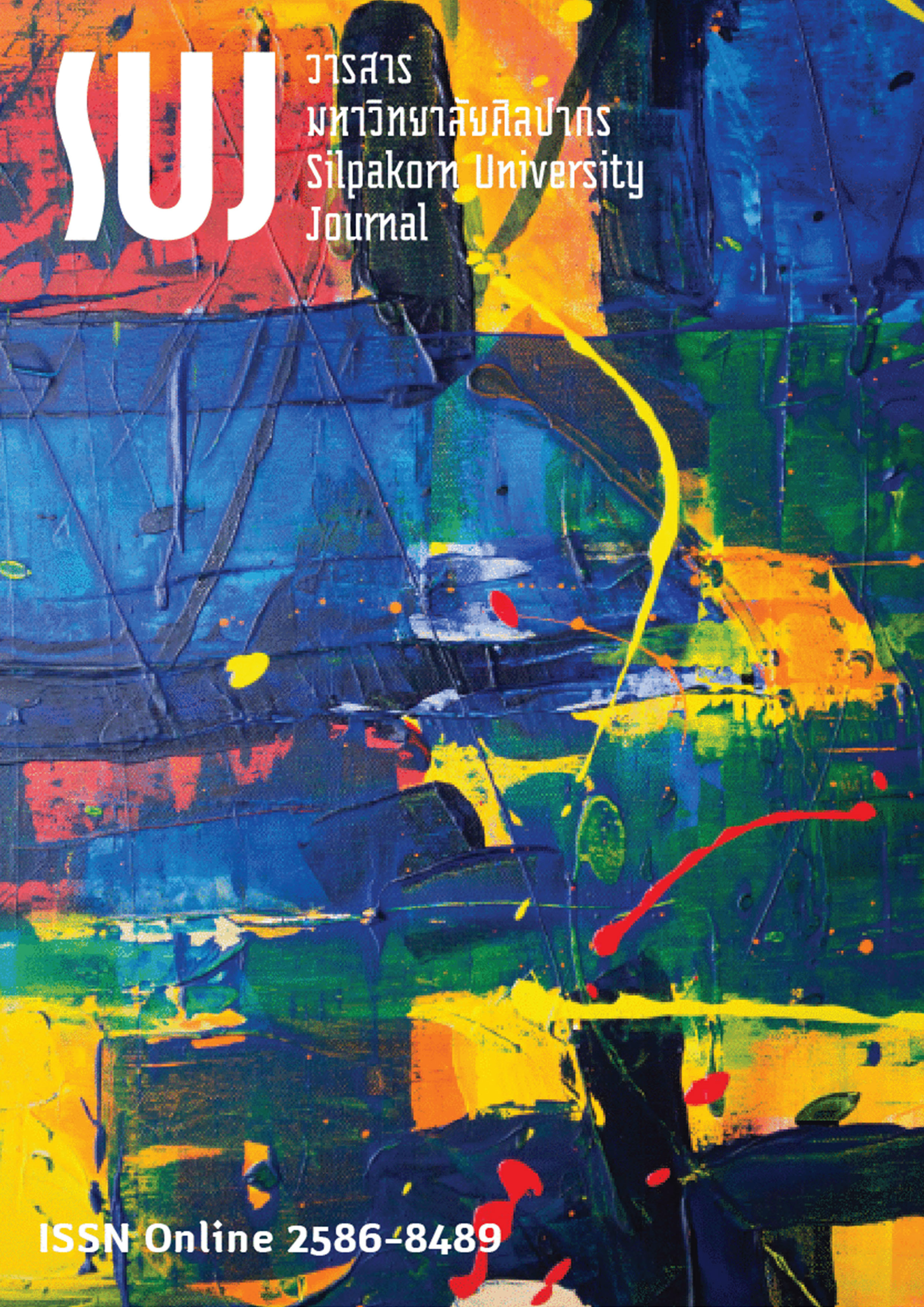การจัดการทรัพยากรกับผลิตภัณฑ์ชุมชนโดยใช้หลักปรัชญาของเศรษฐกิจพอเพียง กรณีศึกษาวิสาหกิจชุมชนโอรังปันตัย จังหวัดปัตตานี (The management of resources and community products through the sufficiency economy philosophy: A case study of O-Rang-Pan-Tai community enterprise in Pattani province)
Main Article Content
Abstract
งานวิจัยนี้มีวัตถุประสงค์เพื่อถอดบทเรียนการจัดการทรัพยากรกับผลิตภัณฑ์ชุมชน และสังเคราะห์ปัจจัยความสำเร็จของการจัดการทรัพยากรกับผลิตภัณฑ์ชุมชน โดยใช้หลักปรัชญาของเศรษฐกิจพอเพียง กรณีศึกษาวิสาหกิจชุมชนโอรังปันตัย จังหวัดปัตตานี การศึกษาครั้งนี้ใช้วิธีการวิจัยเชิงคุณภาพ โดยศึกษาค้นคว้ารวบรวมข้อมูลแนวคิดและทฤษฎีจากเอกสารตำราเพื่อสร้างเครื่องมือทางการวิจัย และลงพื้นที่เก็บข้อมูลจากกลุ่มผู้ให้ข้อมูลหลัก ด้วยการสัมภาษณ์กลุ่มเป้าหมาย จำนวน 3 กลุ่ม ได้แก่ 1) กลุ่มผู้นำและสมาชิกของกลุ่มวิสาหกิจชุมชนโอรังปันตัย 2) กลุ่มผู้นำท้องถิ่น และ 3) ตัวแทนหน่วยงานภาครัฐ ในพื้นที่ จากนั้นนำข้อมูลที่ได้มาวิเคราะห์เชิงเนื้อหา พบว่า บทเรียนการจัดการทรัพยากรกับผลิตภัณฑ์ชุมชนโดยใช้หลักปรัชญาของเศรษฐกิจพอเพียง วิสาหกิจชุมชนโอรังปันตัย จังหวัดปัตตานี ที่เกิดขึ้นประกอบไปด้วย 4 มิติความยั่งยืน ได้แก่ 1) มิติทางเศรษฐกิจ 2) มิติทางสังคม 3) มิติทางสิ่งแวดล้อม และ 4) มิติทางวัฒนธรรม โดยปัจจัยความสำเร็จเกิดจาก 1) ประสิทธิภาพด้านการจัดการทรัพยากร 2) ด้านการจัดการเศรษฐกิจในพื้นที่ และ 3) ด้านการจัดการสังคมและศาสนา อันนำไปสู่การยกระดับคุณภาพชีวิตที่ดีในเชิงการดำรงชีพที่สงบสุข ทั้งนี้ กองอำนวยการรักษาความมั่นคงภายในราชอาณาจักร (กอ.รมน.) สามารถนำผลการศึกษาไปใช้กำหนดยุทธศาสตร์เพื่อการขับเคลื่อนนโยบาย การวางแผน และการบริหารการพัฒนาให้ชัดเจนและตรงทิศทางต่อไป
This research article aims to extract lessons learned in the management of resources and community products, as well as synthesize the success factors of resources and community products management using the sufficiency economy philosophy approach. The case study was conducted on the O-Rang-Pan-Tai community enterprise in Pattani Province. The study employed a qualitative research method, which involved conducting a literature review to gather concepts and theories for the development of research tools. Data collection was carried out through fieldwork, including interviews with three target groups: leaders and members of the O-Rang-Pan-Tai community enterprise group, local leaders, and local government representatives. The data was analyzed using content analysis. The findings revealed that the lessons learned from their management encompassed four dimensions of sustainability: 1) economic dimension, 2) social dimensions, 3) environmental dimension, and 4) cultural dimensions. The success factors are derived from 1) resource management efficiency, 2) local economic management, and 3) social and religious management, which contribute to an improved quality and peaceful living. Furthermore, the Internal Security Operations Command (ISOC) can use these findings to formulate strategies for driving policies, planning, and development administration in a clear and direct manner.
Downloads
Article Details

This work is licensed under a Creative Commons Attribution-NonCommercial-NoDerivatives 4.0 International License.
References
Beeton, S. (2006). Community Development through Tourism. Collingwood, Victoria: Landlinks Press.
Bunnag, Chol, & Kamolnoratep, Pusanisa. (2020). Sufficiency Economy Philosophy Relationship and Sustainable Development Goals (ความสัมพันธ์ระหว่างปรัชญาของเศรษฐกิจพอเพียง (Sufficiency Economy Philosophy: SEP) และเป้าหมายการพัฒนาที่ยั่งยืน (Sustainable Development Goals: SDGs)). SDG MOVE. [Online]. Retrieved August 26, 2021 from https://www.sdgmove.com/2019/09/27/sep-and-sdgs/
Chatkaewnapanon, Yuthasak. (2022). Guideline for Community Product Development: A Case Study of Woven Fabrics in Baan Nakian, Omkoi District, Chiangmai (คู่มือแนวทางการพัฒนาผลิตภัณฑ์จากผ้าทอชุมชนบ้านนาเกียน อำเภออมก๋อย จังหวัดเชียงใหม่). Chiang Mai: Pattrara Prepress.
Chumkate, Jittapon. (2017). Product Development from Local Wisdom to Increase an Efficiency of Community-Based Management with Sustainability in Thai-Muslim Village, Amphur Cha Am, Phetchaburi Province (การพัฒนาผลิตภัณฑ์จากภูมิปัญญาท้องถิ่นเพื่อเพิ่มประสิทธิภาพทางการจัดการชุมชนอย่างยั่งยืนของชุมชนไทยมุสลิม อำเภอชะอำ จังหวัดเพชรบุรี). Phetchaburi: Faculty of Management Science, Silpakorn University.
Ishoh, Anak. (2019). Quality of Life of People in Tambon Sakom Administrative Organization, Thepha District, Songkhla Province (คุณภาพชีวิตของประชาชนในเขตองค์การบริหารส่วนตำบลสะกอม อำเภอเทพา จังหวัดสงขลา). Master’s dissertation, Prince of Songkla University, Songkhla, Thailand.
Johnson, L. J., & LaMontagne, M. J. (1993). Research methods using content analysis to examine the verbal or written communication of stakeholders within early intervention. Journal of Early Intervention, 17(1): 73-79.
Komieng, Bahaem. (1999). The Concept of Justice in the Holy Our’an and Al-Hadith and That of John Locke’s (ความยุติธรรมในคัมภีร์อัลกุรอานและอัลหะดีษ กับทัศนะของจอห์น ล็อค). Master’s dissertation, Prince of Songkla University, Songkhla, Thailand.
Leelakulthanit, O., & Day, R. L. (1992). Quality of life in Thailand. Social Indicators Research, 27(1): 41-57.
Lertpairaud, Aponrat, Krasang, Anuwat, & Phrakhru sangharak Kiettisak Kittipanno. (2017). Social and cultural management of local administrative organizations in Nakhonsawan province (การจัดการสังคมและวัฒนธรรมขององค์กรปกครองส่วนท้องถิ่นในจังหวัดนครสวรรค์). Journal of MCU Social Science Review [Special issue, Book 3], 6(2): 143-160.
Lohwithee, Witsarut. (2019). Islamic doctrines and sufficiency economy philosophy (คำสอนอิสลามกับปรัชญาเศรษฐกิจพอเพียง). Journal of Liberal Arts, Rangsit University, 14(2): 127-141.
Mahtaney, P. (2007). The Development Paradigm: Its Evolution and Importance. In India, China and Globalization: The Emerging Superpowers and the Future of Economic Development, (pp. 256-276). London: Palgrave Macmillan.
Nowakowska-Grunt, J., & Wisniewska-Salek, A. (2014). Managing the local economy on the example of the construction sector companies. Advanced Materials Research, 1020: 783-788.
Office of the National Economic and Social Development Board, Office of the Prime Minister. (2001). The Ninth National Economic and Social Development Plan (2002-2006) (แผนพัฒนาเศรษฐกิจและสังคมแห่งชาติ ฉบับที่ 9 พ.ศ. 2545-2549). Bangkok: Office of the National Economic and Social Development Council.
Office of the National Economic and Social Development Board, Office of the Prime Minister. (2016). The Twelfth National Economic and Social Development Plan (2017-2021) (แผนพัฒนาเศรษฐกิจและสังคมแห่งชาติ ฉบับที่ 12 พ.ศ. 2560-2564). Bangkok: Office of the National Economic and Social Development Council.
Perreault, W. D., Jr., & McCarthy, E. J. (2002). Basic Marketing: A Global-Managerial Approach (14th ed.). New York: McGraw-Hill.
Phrakru Wichotsikkhakit, Plodphai, Sarawut, & Nikornkul, Parinya. (2021). Human resource development of community enterprises in Phichit province according to buddhism (การพัฒนาทรัพยากรมนุษย์กลุ่มวิสาหกิจชุมชนในจังหวัดพิจิตร ตามแนวพระพุทธศาสนา). The Journal of Research and Academics, 4(1): 1-12.
Rammon, Jariya, & Kongsom, Chaiwat. (2021). Research synthesis on guidelines for community forest management: Case studies of community forests in the upper northern of Thailand (การสังเคราะห์งานวิจัยเกี่ยวกับแนวทางการจัดการป่าชุมชน: กรณีศึกษาป่าชุมชนในภาคเหนือตอนบนของประเทศไทย). STOU Journal of Agriculture, 3(1): 16-23.
Rojjanapornthip, Jirawan. (2021). “O-Rang-Pan-Tai” King of Salted Fish, Very Delicious, Products Worth Buying, Good Stuff in Pattani (“โอรังปันตัย”ราชาแห่งปลาเค็ม อร่อยมาก ผลิตภัณฑ์น่าซื้อของดีเมืองปัตตานี). [Online]. Retrieved April 2, 2022 from https://www.technologychaoban.com/bullet-news-today/article_119871
Schuessler, K. F., & Fisher, G. A. (1985). Quality of life research and sociology. Annual Review of Sociology, 11: 129-149.
Sola, P. (2005). The community resource management plan: A tool for integrating IKS into natural resource management. Ethnobotany Research and Applications, 3: 143-154.
Suttipisan, Sutsan. (2020). Principles of Tourism Development Management to Develop the Country (หลักการการบริหารการพัฒนาการท่องเที่ยวเพื่อพัฒนาประเทศ) [Unpublished manuscript]. The Service, Tourism, and Logistics Excellence Center, Kasem Bundit University.
Swinburn, G., Goga, S., & Murphy, F. (2004). Local Economic Development Primer. In Bertelsmann Foundation (Ed.), Strategic Management in Local Economic Development: Cities of Change Knowledge Product Series Vol.3, (pp. 11-12). Washington DC: Bertelsmann Foundation.
The Chaipattana Foundation. (2021). Sufficiency Economy Philosophy (เศรษฐกิจพอเพียง). [Online]. Retrieved April 2, 2022 from https://www.chaipat.or.th/publication/publish-document/sufficiency-economy.html
Totong, Kitiya. (2017). Islamic funeral management and sustainable environmental management (การจัดการศพตามวิถีอิสลามกับการจัดการสิ่งแวดล้อมอย่างยั่งยืน). Journal of Environmental Management, 13(2): 100-117.
Wiraphanphong, Airawee. (2017). Common pool resources in community: The case of Klongladmayom community, Bangramat, Talingchan, Bangkok (การจัดการทรัพยากรร่วมของชุมชนท้องถิ่น : กรณีศึกษาชุมชนคลองลัดมะยม แขวงบางระมาด เขตตลิ่งชัน กรุงเทพมหานคร). Kasetsart University Political Science Review Journal, 4(2): 210-229.
Interview
Masaning, Muhamasukree, President of O-Rang-Pan-Tai Community Enterprise Pattani Province. Interview, March 1, 2022.


